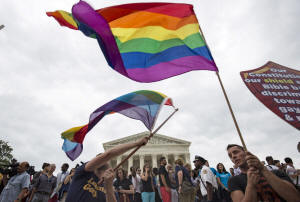Web designer opposed to gay marriage at center of U.S. Supreme Court
clash
 Send a link to a friend
Send a link to a friend
 [December 02, 2022]
By Andrew Chung [December 02, 2022]
By Andrew Chung
WASHINGTON (Reuters) - The wedding websites that Colorado-based web
designer Lorie Smith would like to create for clients might offer
ceremony details, pictures, a story about the couple and a biblical
quote celebrating how through marriage they "become one flesh."
They would not, however, show same-sex nuptials.
Smith, an evangelical Christian who believes marriage is only between a
man and a woman, has taken her fight to refuse to make wedding websites
for same-sex couples and to advertise that policy to the U.S. Supreme
Court in a major case to be argued on Monday. Smith is appealing lower
court rulings backing Colorado.
The stakes are high, pitting the right of LGBT people to seek goods and
services from businesses without discrimination against the right to
free speech under the U.S. Constitution's First Amendment, as asserted
by Smith.
Smith, 38, is married with one child and lives in the Denver suburb of
Littleton. She argues that Colorado anti-discrimination law violates
free speech rights by forcing artists - including web designers - to
express messages through their work that they oppose.

"Colorado is compelling and censoring my speech and forcing me to design
and create custom artwork that celebrates messages that go against my
deeply held beliefs," Smith said in an interview. "My faith is at the
core of who I am."
Public accommodations laws exist in many states, banning discrimination
in areas such as housing, hotels, retail businesses, restaurants and
educational institutions. Colorado first enacted one in 1885. Its
current Anti-Discrimination Act bars businesses open to the public from
denying goods or services to people because of race, gender, sexual
orientation, religion and certain other characteristics, and from
displaying a notice to that effect.
Colorado, civil rights groups and numerous legal scholars warn of a
ripple effect of discrimination against LGBT people and others if Smith
wins, offering a variety of hypothetical situations. Could a commercial
photographer refuse to take pictures of a corporation's female chief
executive? Could a baker refuse to make a birthday cake for a Black
child? Could an architect refuse to design homes for Jewish or Muslim
people?
"It's going to be very difficult for them (Supreme Court justices) to
draw lines in any way that is coherent or analytically sound -
particularly for lower courts to apply - that won't just be a
get-out-of-jail free card because, 'I don't want to serve you or employ
you,'" said Amanda Shanor, an expert in constitutional law and free
speech at the University of Pennsylvania's Wharton School.
The Supreme Court, with its 6-3 conservative majority, has become
increasingly supportive of religious rights and related free speech
claims in recent years even as it has backed LGBT rights in other cases.
The court legalized gay marriage nationwide in a landmark 2015 decision.

'LOVE EVERYONE'
Smith and her lawyers maintain that she is not discriminating against
anyone. She would, for example, happily serve an LGBT customer who wants
graphics for an issue she supports like an animal shelter. She objects,
however, to messages that contradict her Christian beliefs.
"My faith has taught me to love everyone, and that's why I work with
everyone through my business. But that also means I can't create every
message," Smith said.
[to top of second column]
|

Supporters of gay marriage wave the
rainbow flag after the U.S. Supreme Court ruled that the U.S.
Constitution provides same-sex couples the right to marry at the
court building in Washington June 26, 2015. REUTERS/Joshua
Roberts/File Photo

Smith is represented by attorneys from the Alliance Defending
Freedom, a conservative religious rights group. The Supreme Court
did not take up one aspect of her challenge to Colorado law based on
religious rights also protected by the First Amendment.
Alliance Defending Freedom previously represented Denver-area bakery
owner Jack Phillips, who ran afoul of Colorado anti-discrimination
law when he refused based on his Christian beliefs to make a wedding
cake for two men.
His legal battle with Colorado also reached the Supreme Court, which
ruled narrowly in his favor in 2018. That decision determined that
Colorado officials violated his religious rights but stopping short
of carving out a free speech exemption to anti-discrimination laws.
Smith preemptively sued Colorado's civil rights commission and other
state officials in 2016 because she feared she would be punished for
refusing to serve gay weddings.
Colorado has argued that its Anti-Discrimination Act regulates
sales, not speech, to ensure "equal access and equal dignity." Smith
thus is free to sell whatever she wants, including websites with
biblical passages stating an opposite-sex vision of marriage.
The state warned against endorsing Smith's view of free speech
protections.
"It would encompass not only a business's objections to serving
certain customers motivated by sincerely held religious beliefs, but
also objections motivated by ignorance, whim, bigotry, caprice and
more - including pure expressions of racial, sexist or
anti-religious hatred," the state wrote in the brief to the Supreme
Court.
"All the Act requires is that the company sell its website-design
services to the public regardless of the customer's sexual
orientation, religion or other protected characteristic. If a
customer wanted a different website, one that the company did not
offer, the company need not provide it," Colorado added.
The case raises tough questions for the court including who can be
considered an artist entitled to an exception.

President Joe Biden's administration, supporting Colorado in the
case, said Smith's bid for an exemption goes too far because she
seeks a right to refuse to create a wedding website of any kind for
a same-sex couple, even one simply stating logistical details. The
administration concedes that Colorado could not interpret its law to
force Smith to create content praising same-sex marriage or stating
that it is consistent with Christian teachings.
"The government can't force Lorie and people like her to express
messages that go against their deeply held beliefs," said Jacob
Warner, an attorney for Smith.
"Every website she will create will celebrate a view of marriage,"
Warner added.
Smith's lawyers said the case is similar to one in which the Supreme
Court in 1995 let organizers of a St. Patrick's Day parade in Boston
exclude an Irish-American LGBT group.
The Supreme Court's ruling is due by the end of June.
(Reporting by Andrew Chung in New York; Editing by Will Dunham)
[© 2022 Thomson Reuters. All rights
reserved.]
This material may not be published,
broadcast, rewritten or redistributed.
Thompson Reuters is solely responsible for this content.
 |